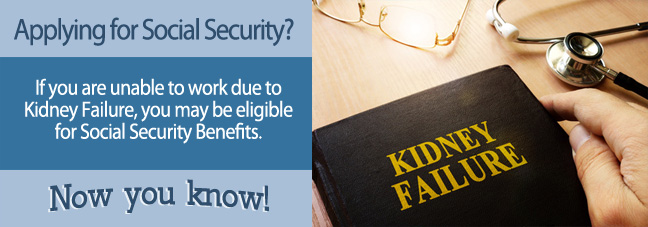Kidney failure is a very serious disability, but even when it is listed in the SSA’s Blue Book, you may still find that an application for either SSDI or SSI disability benefits is rejected. This is most often the case when insufficient evidence that kidney failure has occurred and prevented you from working is available to convince the DDS assessors.
An appeal against the decision to reject the application for benefits is possible. There are several successive stages of the appeal process. Over half of the initial rejections by the SSA are overturned at one or another stage of an appeal, so it is definitely worth pursuing.
How to Appeal the Decision
The first stage of an appeal is to request a “reconsideration” of the original decision. This is done by the Disability Determination Services (DDS). Entirely different personnel are used to assess the evidence submitted with the original application.
A medical consultant and a DDS examiner will jointly assess the evidence available and make a decision whether the original denial was justified. About 10% of reviews lead to an overturning of the original assessment.
If the review again results in a denial of benefits, the next stage of an appeal is to request a hearing by an Administrative Law Judge (ALJ).This request must be made within 60 days of a rejection letter. The ALJ will assess the evidence submitted previously and make a judgment whether the original decisions were justified. In about half the cases that get to this stage of an appeal, the decision is favorable.
If the ALJ’s decision upholds the original application denial, there are still two further stages of appeal which can be pursued. These are an application for your case to be heard by the Appeals Council and past that, by a federal review. Few appeals are successful if they extend to this stage.
Blue Book for Condition
There are three main descriptions of kidney failure in the SSA’s Blue Book. These are:
• Chronic kidney failure after a kidney transplant;
• Chronic kidney disease with peritoneal dialysis or hemodialysis;
• Chronic kidney disease with impaired kidney function.
In addition, your condition must match one of the following:
• Fluid overload syndrome with high blood pressure or vascular congestion;
• Peripheral neuropathy;
• Severe bone pain and abnormalities such as osteitis fibrosa or osteomalacia;
• Weight loss with a BMI of 18.0 or less.
If your kidney failure means that you have not been able to work for a year or more, and your condition matches one of the above, then your case for SSDI or SSI benefits is strong, even if the SSA initially rejects your application.
Consider an RFC
Getting an exact match with one of the Blue Book listings can be difficult if you have developed kidney disease. This is often the reason why an application for disability benefits is refused. You may be able to request a residual functional capacity (RFC) assessment by your doctor.
A RFC gives an indication of how your disability determines how much work you can or cannot do. An RFC assessment may lead to a successful appeal and the SSA may then decide to grant a benefit based on a medical vocational allowance.
Get a Free Evaluation Today
If you are forced to arrange an appeal of your application for disability benefits, you should keep in regular contact with your doctor and ensure that every test and condition determined by the Blue Boo listing has been achieved and documentation is available. You are advised to use a disability attorney throughout any appeal procedure.
